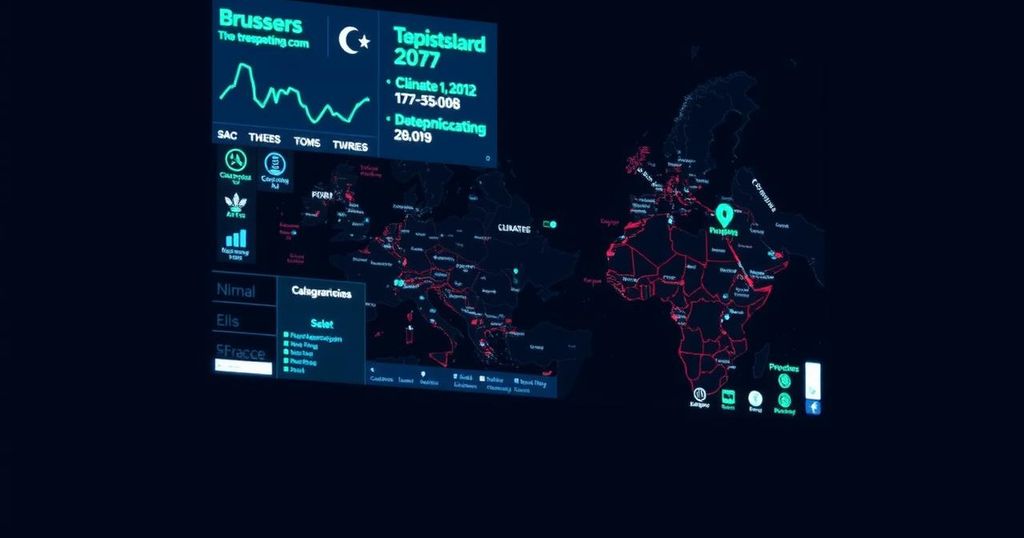Brussels Conversations: Addressing Decarbonization and Economic Challenges of Climate Change
The Brussels Conversations addressed critical topics including port decarbonization and the economic implications of climate refugees. The discussions revealed the anticipated decline of fossil fuel transport in major ports, highlighting the urgent need for adaptation towards low-carbon fuels amidst potential revenue losses. The economic pressures resulting from climate-induced migrations were explored, showcasing how these trends necessitate coordinated responses in logistics and sustainability. Overall, the event fostered significant dialogue among stakeholders in addressing the multifaceted challenges of climate change.
The recent Brussels Conversations highlighted significant discussions surrounding vital issues in decarbonization and climate economics, particularly focusing on port decarbonization and the implications of climate refugees. The backdrop for these insights was framed by the book launch of “Supergrid Super Solution: A Handbook for Energy Independence and a Europe Free from Fossil Fuels.” In this context, a major point of discussion was the impending transformation of maritime operations and the corresponding impact on ports, as major shifts away from fossil fuel transport are anticipated. Port decarbonization, an essential yet underexplored subject, was brought to the forefront, with predictions suggesting that the transport of bulk fossil fuels will greatly decline in the coming years. Currently, around 40% of goods transported globally are fossil fuels, a figure expected to plummet as economies transition towards greener alternatives. Such drastic changes will markedly affect the operational landscape of the approximately 900 major ports worldwide, which may face significant revenue losses and potential consolidation. The discussions elucidated that ports will need to adapt not only to decreasing throughput volumes but also to shifting their energy bunkering practices towards low-carbon fuels. Presently, ports are primarily equipped to handle very low sulfur fuel oil and a minimal amount of biodiesel, which provides little room for the anticipated multi-fuel era necessitated by electrification and sustainable shipping practices. This state of affairs creates a daunting challenge for ports, which must manage increasing operational complexity alongside diminishing revenues. The evidence suggests a likely preference for biofuels and electrification among shipping industries, yet there is a palpable skepticism regarding the viability of alternative fuels like ammonia and hydrogen. Concerns about safety and feasibility remain prevalent within the maritime community, particularly regarding ammonia’s health hazards and the complexities surrounding nuclear propulsion. In parallel, the topic of climate refugees was deliberated upon, bringing light to the economic strains resulting from displacement due to climate change. The Syrian refugee crisis served as a significant case study, illustrating how climate-induced factors exacerbate existing socio-economic vulnerabilities, resulting in mass migrations that provoke political and social turbulence. The conversations also explored the logistical implications of electrification within freight operations, considering how a shift towards electric vehicles could create a two-tier pricing system, ultimately benefiting those who adapt early to these emerging technologies. Additionally, the discussions encapsulated the growing demand for integrated and transparent logistics that reflect emissions reductions, as clients increasingly seek to differentiate themselves in the market based on their sustainable practices. Overall, the Brussels Conversations offered a robust platform for exchange on the critical climate challenges of our time, encompassing diverse perspectives from transportation, economics, and logistics sectors. As industries brace for significant changes accompanying the low-carbon transition, networking and collaborative efforts will be essential to harness expertise and drive forward viable solutions for decarbonization and resilience against climate impacts.
The discussions took place against the backdrop of an important book launch relevant to energy independence and the transition away from fossil fuels. These conversations highlighted urgent issues related to decarbonization in transportation and energy sectors, emphasizing the need for sustainable practices amidst evolving economic and environmental landscapes. The impact of climate change on human displacement further underscored the interconnectedness of environmental and socio-economic issues, necessitating comprehensive strategies in addressing these complex challenges.
In conclusion, the Brussels Conversations underscored the imperative of addressing decarbonization in the transport sector and the significant economic implications of climate change-induced displacement. As ports and related industries prepare for transformative changes, an urgent call for collaboration and innovative strategies emerges to navigate the operational complexities and capitalize on sustainable opportunities. The discourse illuminated the critical interlinkages between climate action and economic resilience, advocating for proactive engagement in shaping a sustainable future.
Original Source: cleantechnica.com




Post Comment